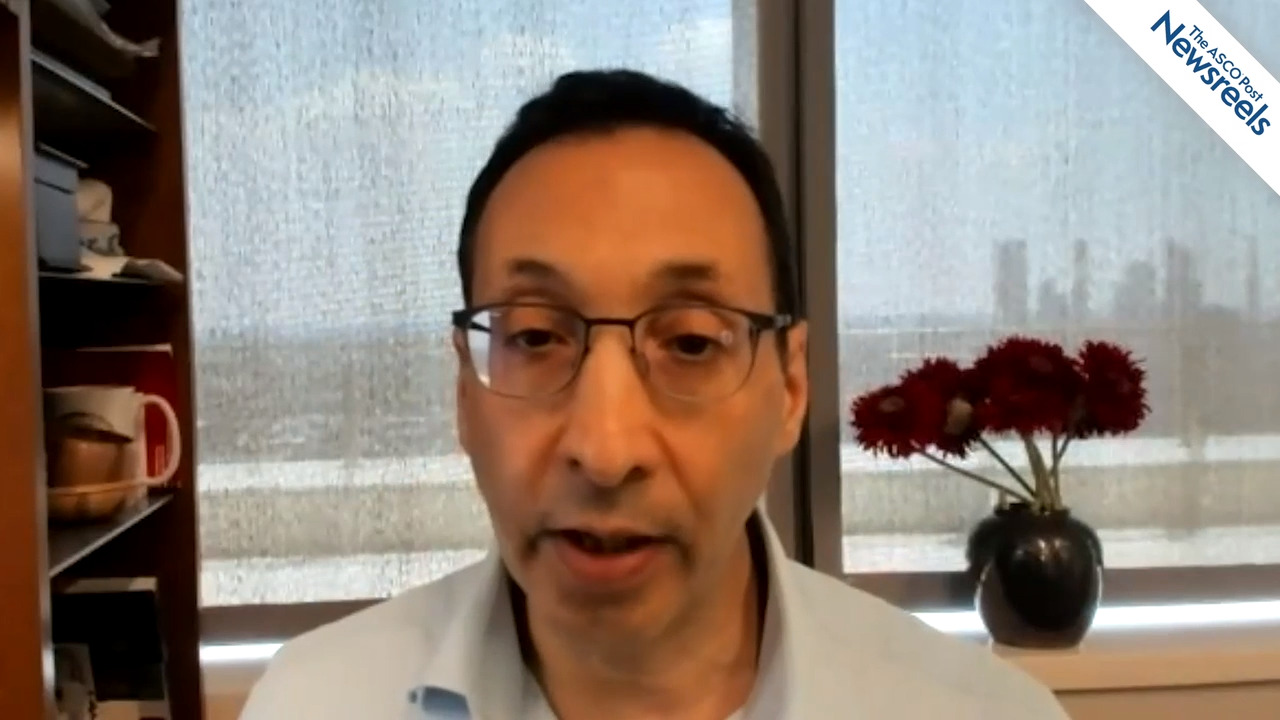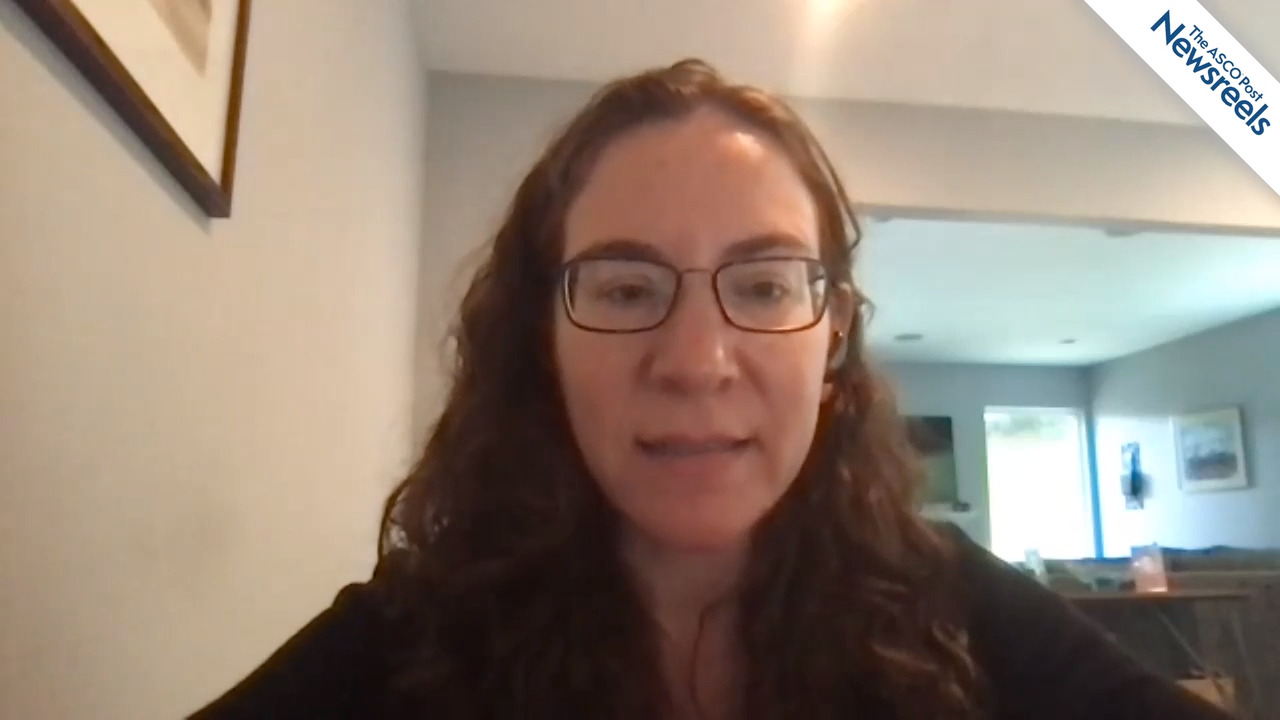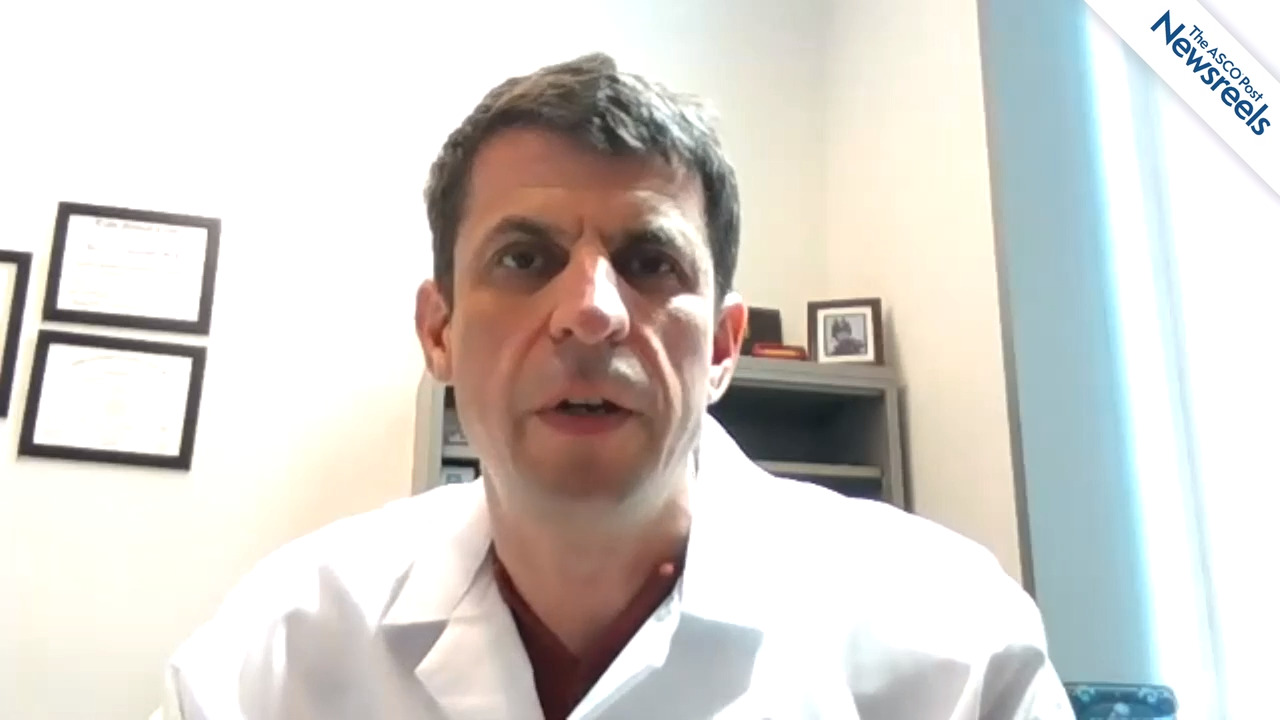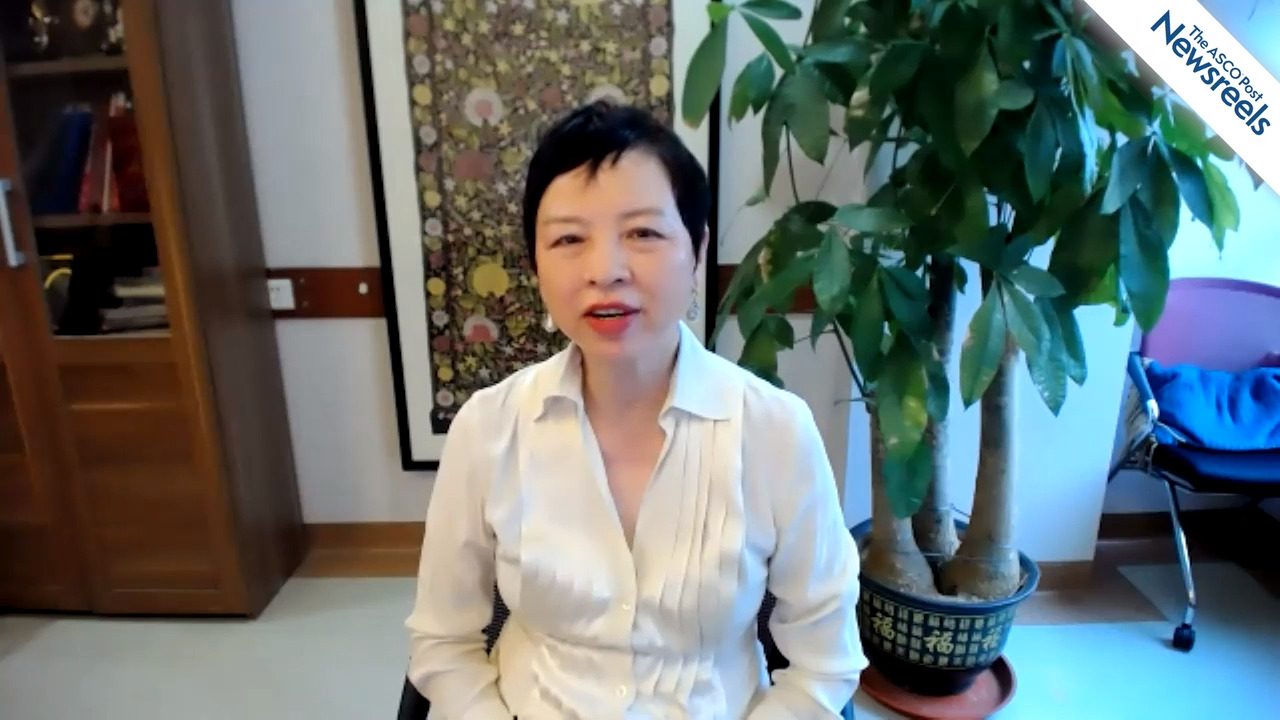Sacituzumab Govitecan-hziy for Locally Advanced or Metastatic Triple-Negative Breast Cancer
On April 7, 2021, sacituzumab govitecan-hziy was granted regular approval for treatment of patients with unresectable locally advanced or metastatic triple-negative breast cancer who have received two or more prior systemic therapies, at least one of them for metastatic disease.1 Sacituzumab...
Sacituzumab Govitecan-hziy for Locally Advanced or Metastatic Urothelial Cancer
On April 13, 2021, sacituzumab govitecan-hziy was granted accelerated approval to treat patients with locally advanced or metastatic urothelial cancer who had received platinum-containing chemotherapy and either a PD-1 or a PD-L1 inhibitor.1 Supporting Efficacy Data Approval was based on findings...
FDA Pipeline: Reviews for Agents in Acute Graft-vs-Host Disease, Nasopharyngeal and Ovarian Cancers
Recently, the U.S. Food and Drug Administration (FDA) granted Priority Review to an agent for the prevention of acute graft-vs-host disease; Breakthrough Therapy designation to an anti–PD-1 monoclonal antibody for the treatment of metastatic nasopharyngeal carcinoma; and Fast Track designation to a ...
Patients With Melanoma Previously Treated With PD-1 or MAPK Inhibitors May Be Less Likely to Respond to ACT-TIL Therapy
Patients with metastatic melanoma who were previously treated with PD-1 or MAPK inhibition are significantly less likely to develop durable objective responses to adoptive cell transfer of tumor-infiltrating lymphocytes (ACT-TIL) than patients naive to these treatments, according to a study...
Adjuvant Pembrolizumab May Improve Disease-Free Survival in Patients With High-Risk Renal Cell Carcinoma
As reported in The New England Journal of Medicine by Toni K. Choueiri, MD, and colleagues, an interim analysis of the phase III KEYNOTE-564 trial showed improved disease-free survival with adjuvant pembrolizumab vs placebo after nephrectomy in high-risk patients with clear cell renal cell...
FDA Approves Nivolumab for Adjuvant Treatment of Urothelial Carcinoma
On August 19, the U.S. Food and Drug Administration (FDA) approved the anti–PD-1 therapy nivolumab (Opdivo) for the adjuvant treatment of patients with urothelial carcinoma who are at high risk of disease recurrence after undergoing radical resection. This is the first FDA approval for adjuvant...
Outcomes Notably Improving for Adult ALL
Outcomes in adults with acute lymphoblastic leukemia (ALL) are almost rivaling those in pediatric ALL, thanks to the benefits achieved by incorporating blinatumomab and inotuzumab into chemotherapy regimens. New ways of administering the chemotherapy component are also increasing tolerability and...
Does Antibiotic Exposure Affect Response to First-Line Chemoimmunotherapy in Patients With NSCLC?
In an international, multicenter study, researchers evaluated the impact of prior and concurrent antibiotic exposure in a cohort of patients with advanced non–small cell lung cancer (NSCLC) treated with first-line chemoimmunotherapy combinations. In contrast to what has been reported in patients...
Cetuximab Plus Avelumab as Rechallenge Therapy for RAS Wild-Type Metastatic Colorectal Cancer
In an Italian phase II trial reported in JAMA Oncology, Martinelli et al found that cetuximab rechallenge plus avelumab showed activity and was well tolerated in patients with RAS wild-type metastatic colorectal cancer who had responded to first-line chemotherapy plus an anti-EGFR agent and then...
Eric Deutsch, MD, PhD, Comments on the Averectal and AVANA Trials in Rectal Cancer
Eric Deutsch, MD, PhD, Professor and Chair of Radiation Oncology at Gustave Roussy, Villejuif, France, commended the speakers for conducting trials whose results he found “very interesting.” The Averectal trial involved a short course of radiation with modified FOLFOX-6 (oxaliplatin, fluorouracil...
Avelumab Under Study as Adjunct to Neoadjuvant Therapy for Rectal Cancer
In the treatment of newly diagnosed locally advanced rectal cancer, two phase II studies evaluating the addition of the PD-L1 inhibitor avelumab to chemoradiotherapy showed promising rates of pathologic complete response, major pathologic response, and tumor downstaging. The study investigators...
Donor-Derived CD7 CAR T Cells May Lead to Remissions in Patients With Relapsed or Refractory T-ALL
In a Chinese single-institution phase I study reported in the Journal of Clinical Oncology, Pan et al found that donor-derived CD7 chimeric antigen receptor (CAR) T-cell therapy produced a high complete remission rate in patients with relapsed or refractory T-cell acute lymphoblastic leukemia...
Experimental Small-Molecule Inhibitor May Improve Responses to Cellular Therapies in Advanced CLL
Too many “exhausted” T cells left in the wake of aggressive chemotherapy regimens for patients with advanced chronic lymphocytic leukemia (CLL) make it more challenging for chimeric antigen receptor (CAR) T-cell therapy to do its job. Now, a new study from researchers at the Perelman School of...
FDA Grants Accelerated Approval to Dostarlimab-gxly for dMMR Advanced Solid Tumors
On August 17, the U.S. Food and Drug Administration (FDA) granted accelerated approval to dostarlimab-gxly (Jemperli), an anti–PD-1 antibody, for adult patients with mismatch repair–deficient (dMMR) recurrent or advanced solid tumors, as determined by an FDA-approved test, who have had disease...
Study Identifies Potential Mechanisms of Resistance to Sacituzumab Govitecan-hziy in Patients With Triple-Negative Breast Cancer
Researchers have determined how a highly aggressive type of breast cancer may evade treatment with the compound sacituzumab govitecan-hziy, according to findings published by Coates et al in Cancer Discovery. Their results could help improve therapy and ultimately prolong survival for patients with ...
Small Study Evaluates Combination Ipilimumab/Nivolumab in Patients With Angiosarcoma
In a small study of 16 patients with angiosarcoma published by Michael Wagner, MD, and colleagues in the Journal for ImmunoTherapy of Cancer, 4 patients experienced a partial or complete response to treatment with a combination of the immunotherapies ipilimumab and nivolumab, and another 2 patients ...
Steven M. Horwitz, MD, on Advanced-Stage Mycosis Fungoides and Sezary Syndrome: Update on Management Practices
Steven M. Horwitz, MD, of Memorial Sloan Kettering Cancer Center, discusses treatments for advanced mycosis fungoides and Sezary syndrome, including brentuximab vedotin and mogamulizumab, and how best to choose among treatments.
James O. Armitage, MD, on Advanced Hodgkin Lymphoma: Choosing Among BEACOPP, A-AVD, and Checkpoint Inhibitors
James O. Armitage, MD, of the University of Nebraska Medical Center, discusses various treatment regimens for patients with Hodgkin lymphoma, including BEACOPP, brentuximab vedotin, ABVD, A-AVD, nivolumab, and pembrolizumab—and the factors to consider when choosing among them.
Bruce D. Cheson, MD, and Stephen M. Ansell, MD, PhD, on Non-Hodgkin and Follicular Lymphomas: Integrating Non–CAR T-Based Treatments
Stephen M. Ansell, MD, PhD, of the Mayo Clinic, and Bruce D. Cheson, MD, of the Lymphoma Research Foundation, engage in a lively debate about CAR T-cell therapy, how it fits in with immunotherapy and nonchemotherapy approaches, and how to decide which treatment is right for which patient, especially given the many challenges of obtaining CAR T cells.
Alison J. Moskowitz, MD, on ABVD in Hodgkin Lymphoma: Adding Brentuximab Vedotin and Checkpoint Inhibitors to Standard Treatment
Alison J. Moskowitz, MD, of Memorial Sloan Kettering Cancer Center, discusses the combination ABVD (doxorubicin, bleomycin, vinblastine, and dacarbazine), individualized approaches for treating patients with Hodgkin lymphoma, and novel methods for risk stratification.
Alexey V. Danilov, MD, PhD, on Lymphoid Malignancies: Novel Agents Targeting BTK Inhibitor–Resistant Disease
Alexey V. Danilov, MD, PhD, of City of Hope, discusses the uses and side effects of cellular and immune therapies, including venetoclax and obinutuzumab, which may prove to be effective in treating highly resistant lymphoid malignancies such as chronic lymphocytic leukemia.
Teclistamab Shows Efficacy, Produces Durable Responses in Relapsed or Refractory Multiple Myeloma
In a phase I trial (MajesTEC-1) reported in The Lancet, Saad Z. Usmani, MD, FACP, and colleagues found that the B-cell maturation antigen (BCMA)-CD3 bispecific antibody teclistamab produced a high rate of durable responses at the recommended phase II dose in patients with relapsed or refractory...
Meta-analysis of Outcomes With the Addition of Adjuvant Trastuzumab to Chemotherapy for HER2-Positive Breast Cancer
In a study conducted by the Early Breast Cancer Trialists’ Collaborative Group and reported in The Lancet Oncology by Bradley et al, an individual patient data meta-analysis of randomized trials has shown that the addition of adjuvant trastuzumab to chemotherapy reduces the risk of disease...
Tackling the Challenge of Pancreatic Cancer: New Approaches
Pancreatic cancer remains an incorrigible foe, but recent advances in genomic profiling and targeted drug development are slowly improving the outlook for patients, according to Eileen M. O’Reilly, MD, Winthrop Rockefeller Endowed Chair in Medical Oncology and Section Head,...
FDA Pipeline: Reviews for Agents in Lung Cancer, Thyroid Cancer, Kidney Cancer, and More
Recently, the U.S. Food and Drug Administration (FDA) accepted applications for agents aiming to treat non–small cell lung cancer (NSCLC), differentiated thyroid cancer, renal cell carcinoma (RCC), hypersensitive acute lymphoblastic leukemia (ALL), mucosal melanoma, and endometrial carcinoma....
FDA Approves Lenvatinib/Pembrolizumab for Advanced Renal Cell Carcinoma
On August 10, the U.S. Food and Drug Administration (FDA) approved the combination of lenvatinib (Lenvima) plus pembrolizumab (Keytruda) for the first-line treatment of adult patients with advanced renal cell carcinoma (RCC). CLEAR Trial The efficacy of this combination was investigated in CLEAR...
Peihua (Peggy) Lu, MD, on CAR T-Cell Therapy: Research in China
Peihua Lu, MD, of Lu Daopei Hospital, discusses the state of research in China on CAR T-cell therapy, placing it in the context of the global development pipeline and the progress being made.
Addition of Avelumab to Chemotherapy in Previously Untreated Patients With Advanced Epithelial Ovarian Cancer: JAVELIN Ovarian 100 Trial
As reported by Bradley J. Monk, MD, and colleagues in The Lancet Oncology, the phase III JAVELIN Ovarian 100 trial showed no progression-free survival benefit with the addition of concurrent and/or maintenance avelumab to chemotherapy in previously untreated patients with advanced epithelial...
JAVELIN Head and Neck 100 Trial: When Failure Seems Fatal, Hope Is Not Lost
Data from KEYNOTE-048 showed that the combination of the checkpoint inhibitor pembrolizumab with platinum-containing therapy improved overall survival vs cetuximab plus chemotherapy in patients with recurrent or metastatic head and neck squamous cell carcinoma (HNSCC).1 The findings provided hope...
No Progression-Free Survival Benefit With First-Line Avelumab Plus Chemoradiotherapy in Squamous Cell Carcinoma of the Head and Neck
As reported in The Lancet Oncology by Nancy Y. Lee, MD, of Memorial Sloan Kettering Cancer Center, and colleagues, the phase III JAVELIN Head and Neck 100 trial has shown no improvement in progression-free survival with the addition of the PD-L1 inhibitor avelumab to chemoradiotherapy in patients...
Expert Point of View: Melinda L. Telli, MD
The invited discussant of GeparNuevo,1 Melinda L. Telli, MD, Associate Professor of Medicine at Stanford University School of Medicine, Director of the Breast Cancer Program at the Stanford Cancer Institute, and Associate Director of the Stanford Women’s Cancer Center, welcomed the additional data...
Neoadjuvant Durvalumab Improves Long-Term Outcomes in the GeparNuevo Trial
In the phase II GeparNuevo trial, patients with early triple-negative breast cancer receiving the PD-L1 inhibitor durvalumab in addition to chemotherapy as neoadjuvant therapy saw improvements in long-term outcomes. The results were presented at the 2021 ASCO Annual Meeting by Sibylle Loibl, MD,...
Expert Point of View: Leslie Popplewell, MD
“Naratuximab emtansine plus rituximab appears to be an effective and well tolerated combination in a heavily pretreated population. The results of the study are very promising,” said Leslie Popplewell, MD, Associate Clinical Professor, Department of Hematology and Hematopoietic Cell...
Expert Point of View: Kei Muro, MD, PhD
The RATIONALE 302 trial1 was discussed by Kei Muro, MD, PhD, of Aichi Cancer Center Hospital in Nagoya, Japan, who found the results promising. However, Dr. Muro questioned the role of PD-1/L1 inhibitors as second-line therapy for advanced esophageal squamous cell carcinoma. RATIONALE 302 is the...
RATIONALE 302: Tislelizumab Improves Overall Survival as Second-Line Treatment of Esophageal Cancer
In the phase III RATIONALE 302 trial, the novel anti–PD-1 antibody tislelizumab, being developed in China, improved overall survival vs chemotherapy as second-line therapy for esophageal squamous cell carcinoma, according to Jaffer Ajani, MD, of The University of Houston MD Anderson Cancer Center,...
Adjuvant Nivolumab Improves Disease-Free Survival in High-Risk Muscle-Invasive Urothelial Carcinoma
As reported in The New England Journal of Medicine by Dean F. Bajorin, MD, of the Department of Medicine, Memorial Sloan Kettering Cancer Center, and colleagues, an interim analysis of the phase III CheckMate 274 trial has shown improved disease-free survival with adjuvant nivolumab vs placebo...
Pertuzumab and Trastuzumab in Previously Treated Patients With HER2-Positive Metastatic Biliary Tract Cancer
As reported in The Lancet Oncology by Milind Javle, MD, and colleagues, findings in a cohort of the phase IIa MyPathway multiple basket study showed that the combination of pertuzumab and trastuzumab produced responses in some previously treated patients with HER2-positive metastatic biliary tract...
A New Era of Hope for Patients With Triple-Negative Breast Cancer
Triple-negative breast cancer is a particularly devastating subtype of breast cancer, as it is often diagnosed in young women and is associated with an exceptionally poor prognosis. The “triple-negative” designation indicates that the three key features driving most breast cancers (estrogen...
Is Disease-Free Survival the Best Endpoint for Adjuvant Nivolumab in High-Risk, Muscle-Invasive Urothelial Carcinoma?
The role of adjuvant treatment for invasive, high-grade bladder cancer remains controversial and challenging. Sternberg et al reported a statistically significant progression-free survival benefit from adjuvant combination gemcitabine/cisplatin (GC) or MVAC (methotrexate, vinblastine, doxorubicin, ...
Adjuvant Nivolumab Improves Disease-Free Survival in High-Risk Muscle-Invasive Urothelial Carcinoma
As reported inThe New England Journal of Medicine by Dean F. Bajorin, MD, of the Department of Medicine, Memorial Sloan Kettering Cancer Center, and colleagues, an interim analysis of the phase III CheckMate 274 trial has shown improved disease-free survival with adjuvant nivolumab vs placebo...
RATIONALE 208: ‘Durable Clinical Activity’ Reported With Tislelizumab in Advanced Liver Cancer
With the investigational checkpoint inhibitor tislelizumab, durable responses were achieved by some patients with previously treated advanced hepatocellular carcinoma, regardless of the number of prior lines of therapy, in the phase II RATIONALE 208 trial. These findings were presented during the...
Tremelimumab, Durvalumab, or Both in Unresectable Hepatocellular Carcinoma
In a randomized expansion phase of a phase I/II study reported in the Journal of Clinical Oncology, Robin Kate Kelley, MD, and colleagues found that a novel regimen consisting of a single priming dose of tremelimumab in combination with durvalumab was associated with good outcomes in patients with...
Neoadjuvant Cabozantinib/Nivolumab May Make Resection Possible for Some Patients With Liver Cancer
A combination of the kinase inhibitor cabozantinib and the immunotherapy nivolumab may make curative surgery possible for some patients with liver cancer who would generally not be considered candidates for surgery, according to research published by Ho et al in Nature Cancer. Rates of Resection...
Surbhi Sidana, MD, Comments on CAR T-Cell Therapy and Bispecific Antibodies Targeting Myeloma
The session’s invited discussant Surbhi Sidana, MD, Assistant Professor of Medicine, Stanford University, said CAR T-cell therapy and bispecific antibodies targeting myeloma are emerging as potentially effective options for patients with highly refractory disease. For this population of triple...
Bispecific Antibodies Advance in Relapsed or Refractory Multiple Myeloma
For the challenging population of patients with multiple myeloma who have become refractory to essentially all current treatments, new approaches are much needed. Early clinical trials data suggest bispecific antibodies may help meet this need, as suggested by studies presented at the 2021 ASCO...
Pembrolizumab Shows Durable Antitumor Activity in Both Locally Advanced and Recurrent/Metastatic Squamous Cell Carcinomas
The results of the second interim analysis of the KEYNOTE-629 study of pembrolizumab in cutaneous squamous cell carcinoma confirmed durable antitumor activity in both the locally advanced and the recurrent/metastatic settings. Adverse events with pembrolizumab were generally consistent with its...
FDA Approves Pembrolizumab in Combination for High-Risk, Early-Stage Triple-Negative Breast Cancer
On July 26, the U.S. Food and Drug Administration (FDA) approved pembrolizumab (Keytruda) for high-risk, early-stage triple-negative breast cancer in combination with chemotherapy as a neoadjuvant treatment, and then continued as a single agent as adjuvant treatment after surgery. The FDA also...
Benefits of Adjuvant Pembrolizumab in Melanoma Reinforced by EORTC 1325/KEYNOTE-054 Updates
Adjuvant anti–PD-1 antibody therapy is widely used for stage III melanoma, given the approvals of pembrolizumab and nivolumab. These approvals were based on significantly improved relapse-free survival in the CheckMate 238 trial of nivolumab compared with ipilimumab and the EORTC 1325/KEYNOTE-054...
Adjuvant Pembrolizumab Improves Distant Metastasis–Free Survival in Resected High-Risk Stage III Melanoma
As reported in The Lancet Oncology by Alexander M.M. Eggermont, MD, of Princess Máxima Center, Utrecht, the Netherlands, and colleagues, the pivotal phase III EORTC 1325/KEYNOTE-054 trial has shown significant improvement in the secondary endpoint of distant metastasis–free survival, as well as...
Dostarlimab-gxly for Mismatch Repair–Deficient Recurrent or Advanced Endometrial Cancer
On April 22, 2021, the PD-1 inhibitor dostarlimab-gxly was granted accelerated approval for treatment of adults with mismatch repair–deficient recurrent or advanced endometrial cancer, as determined by a U.S. Food and Drug Administration (FDA)-approved test, that has progressed on or following a...






